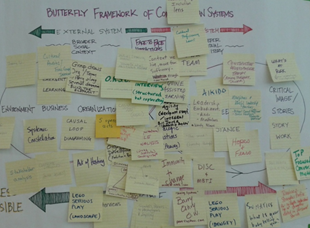Understanding Systems and Ecologies in Risk
 It was Karl Weick (1979) who outlined organizing as: ‘consensually validated grammar for reducing equivocality by means of sensible interlocking behaviours’. That is such a complete definition of how people arrange. If we consider organizing as ‘consensually validated grammar’ then we take a look at the language codes utilized by teams to create shared commonality, norms and a collective unconscious.
It was Karl Weick (1979) who outlined organizing as: ‘consensually validated grammar for reducing equivocality by means of sensible interlocking behaviours’. That is such a complete definition of how people arrange. If we consider organizing as ‘consensually validated grammar’ then we take a look at the language codes utilized by teams to create shared commonality, norms and a collective unconscious.
When people organise they create programs and ecologies, open and closed programs (https://safetyrisk.net/balancing-open-and-closed-systems-in-risk/ ) and a dialectic between each. If we actually wish to sort out risk successfully we have to perceive an entire vary of programs and ecologies in how people arrange, this contains:
- Verbal programs
- Visible programs
- Aural programs
- Written programs
- Social ecologies
- Cultural ecologies
- Delusion-symbol ecologies
- Poetic ecologies
Why is it that when Security speaks of programs it solely thinks of paperwork? Why is it that when this business speaks of language it solely thinks of it in the type of recorded textual content and propositions?
For those who ever have the unlucky expertise of attending to court docket you’ll rapidly be taught that the authorized career thinks way more broadly about programs. Don’t suppose for a second that the slogans and mantras spoken and written in your group will NOT be one thing you can be held accountable to in a court docket (https://vimeo.com/163499152 ).
Sadly, the evolution of the risk and safety business has locked it right into a trajectory of closed paper-based programs. A lot so, the business has little cognizance of the programs and ecologies listed above. But, in relation to accountability all of those are crucial in understanding why issues go as they do. No surprise when being interrogated in court docket that Security not often comes off nicely.
8. Deepwater Horizon from Human Dymensions on Vimeo.




